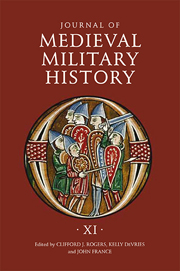Book contents
- Frontmatter
- Contents
- List of Illustrations and Tables
- 1 Military Games and the Training of the Infantry
- 2 The Battle of Civitate: A Plausible Account
- 3 The Square “Fighting March” of the Crusaders at the battle of Ascalon (1099)
- 4 How the Crusades Could Have Been Won: King Baldwin II of Jerusalem's Campaigns against Aleppo (1124–5) and Damascus (1129)
- 5 Saint Catherine's Day Miracle – the Battle of Montgisard
- 6 The Military Effectiveness of Alan Mercenaries in Byzantium, 1301–1306
- 7 Winning and Recalling Honor in Spain: Pro-English Poetry in Celebration of the Battle of Nájera (1367)
- 8 The Wars and the Army of the Duke of Cephalonia Carlo I Tocco (c. 1375–1429)
- 9 Sir John Radcliffe, K.G. (d. 1441): Miles Famossissimus
- 10 Defense Schemes of Southampton in the Late Medieval Period, 1300–1500
- 11 French and English Acceptance of Medieval Gunpowder Weaponry
- Journal of Medieval Military History 1477–545X
9 - Sir John Radcliffe, K.G. (d. 1441): Miles Famossissimus
Published online by Cambridge University Press: 05 October 2013
- Frontmatter
- Contents
- List of Illustrations and Tables
- 1 Military Games and the Training of the Infantry
- 2 The Battle of Civitate: A Plausible Account
- 3 The Square “Fighting March” of the Crusaders at the battle of Ascalon (1099)
- 4 How the Crusades Could Have Been Won: King Baldwin II of Jerusalem's Campaigns against Aleppo (1124–5) and Damascus (1129)
- 5 Saint Catherine's Day Miracle – the Battle of Montgisard
- 6 The Military Effectiveness of Alan Mercenaries in Byzantium, 1301–1306
- 7 Winning and Recalling Honor in Spain: Pro-English Poetry in Celebration of the Battle of Nájera (1367)
- 8 The Wars and the Army of the Duke of Cephalonia Carlo I Tocco (c. 1375–1429)
- 9 Sir John Radcliffe, K.G. (d. 1441): Miles Famossissimus
- 10 Defense Schemes of Southampton in the Late Medieval Period, 1300–1500
- 11 French and English Acceptance of Medieval Gunpowder Weaponry
- Journal of Medieval Military History 1477–545X
Summary
Sir John Radcliffe of Attleborough, Norfolk, had an admirable career as a soldier and administrator in the service of the Lancastrian kings of England. His assignments took him into all the dominions of the crown: Ireland, Wales, Normandy, and Gascony. While Sir John's life is of considerable interest in its own right, his career both exemplifies as well as personalizes the English military experience of his lifetime.
Sir John came from a landed family with Lancashire roots. He was the second son of James Radcliffe (d. 1410) and his wife Joan, daughter of Sir John Tempest of Bracewell, Yorkshire. Nothing has come to light on the early years of Sir John, but his career suggests that he was given a firm grounding in military, financial, and administrative matters. The first sure record of John Radcliffe is in a military context helping his king consolidate his hold upon the throne. Many years after the event, in 1429, it was noted that while an esquire (probably in the service of his father, James), John had participated in the battle of Shrewsbury on 21 July 1403. In that battle the first king of the Lancastrian dynasty, Henry IV, defeated a rebel force led by Henry Percy, known as Hotspur, the son of Henry Percy, earl of Northumberland. Six days after the battle, James Radcliffe was one of the men commissioned to gather forces from Lancashire and bring them to the king at Pontefract in Yorkshire.
- Type
- Chapter
- Information
- Journal of Medieval Military HistoryVolume XI, pp. 183 - 214Publisher: Boydell & BrewerPrint publication year: 2013

